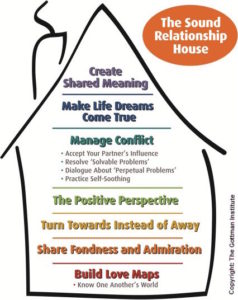The Sound Relationship House Part 3: Ways to Increase Fondness and Admiration

We use many of these tools for increasing fondness and admiration in couples counseling, but you can use them to good effect without being in therapy. The most important thing to remember is that changing your relationship takes care and attention. Beginning to practice skills that increase the positive interactions and decrease the negative will not be a straight course. There will be zigs and zags because old habits take time to eliminate. But the beauty of making these changes a priority is that both partners are working together and taking responsibility for the quality of their marriage.
Six Ways You Can Improve Your Relationship
The following list is adapted from Dr. John Gottman’s book, Why Marriages Succeed or Fail: And How You Can Make Yours Last (1995).
- Show interest. Smartphones and tablets are as prevalent as TV used to be, claiming attention in the form of online news, games, email, or Facebook; some uses are work- or kid-related, but others are just distractions. All can serve to divert attention from each other. Make sure you have your partner’s attention before talking. Something as simple as eye contact goes a long way. I have worked with couples that rarely look at each other, maybe for days, yet are unaware that this is happening. Showing interest means looking, seeing, and listening with interest.
- Be affectionate. You don’t have to give each other a 30-minute back rub to increase affection. And daily affection should not be performed just as a means to get more sex. As I mentioned in a previous post, it is important to show non-sexual affection on a regular basis. Holding hands, walking arm in arm, or sitting side by side are all simple ways to increase affection. Hugs and kisses are obvious ways to show affection—but be creative. When a marriage runs into trouble, partners have often stopped physical touch. Bringing touch back will feel good to both the giver and the receiver.
- Show you care. During therapy, I have a couple look over a list of things they would like their partner to do for them. This list has examples of big and small activities that reinforce caring behavior. A small one might be calling during the afternoon and checking in, or stopping at the market and picking up something for dinner. If such activities have become routine, then think of other things you would like, but don’t be extravagant. These activities should be relatively easy to perform and repeat.
- Be empathic. One of the exercises we do in couple’s therapy is The Stress Reducing Conversation. This consists of letting your partner talk for a solid 10-minutes without interrupting, except to express interest, support, and show concern. Showing that you can understand what your partner is facing at work or with a family member helps them feel supported.
- Be accepting. Our instinct is to correct, criticize, and instruct. It is important to listen without jumping in too much. Dr. John Gottman’s term for the four most harmful communication styles that threaten a relationship is The Four Horsemen. One of the most destructive of these is Contempt. Signs of contempt are correcting your partner’s grammar during a heated discussion or rolling your eyes when they speak.
- Play together. Life involves many chores and tasks that are unavoidable. Find ways to play and joke around. It is important to have a date night or afternoon, but don’t always go to dinner and a movie; sometimes a movie is like parallel play, something you do alongside rather than together. Spend time in activities that make you both laugh. Think of things that were fun when your relationship was new. Playing together creates a bond that is unique to your relationship. We can have friends for many different activities, but with your partner, make sure you share joy and light-heartedness.

 A great marriage needs a strong foundation. Remember the story of the three little pigs? The first little pig built his house of straw and the second made his house with wood. The third pig built his house of brick while the first two pigs played, taunting him for working so hard.
A great marriage needs a strong foundation. Remember the story of the three little pigs? The first little pig built his house of straw and the second made his house with wood. The third pig built his house of brick while the first two pigs played, taunting him for working so hard.



